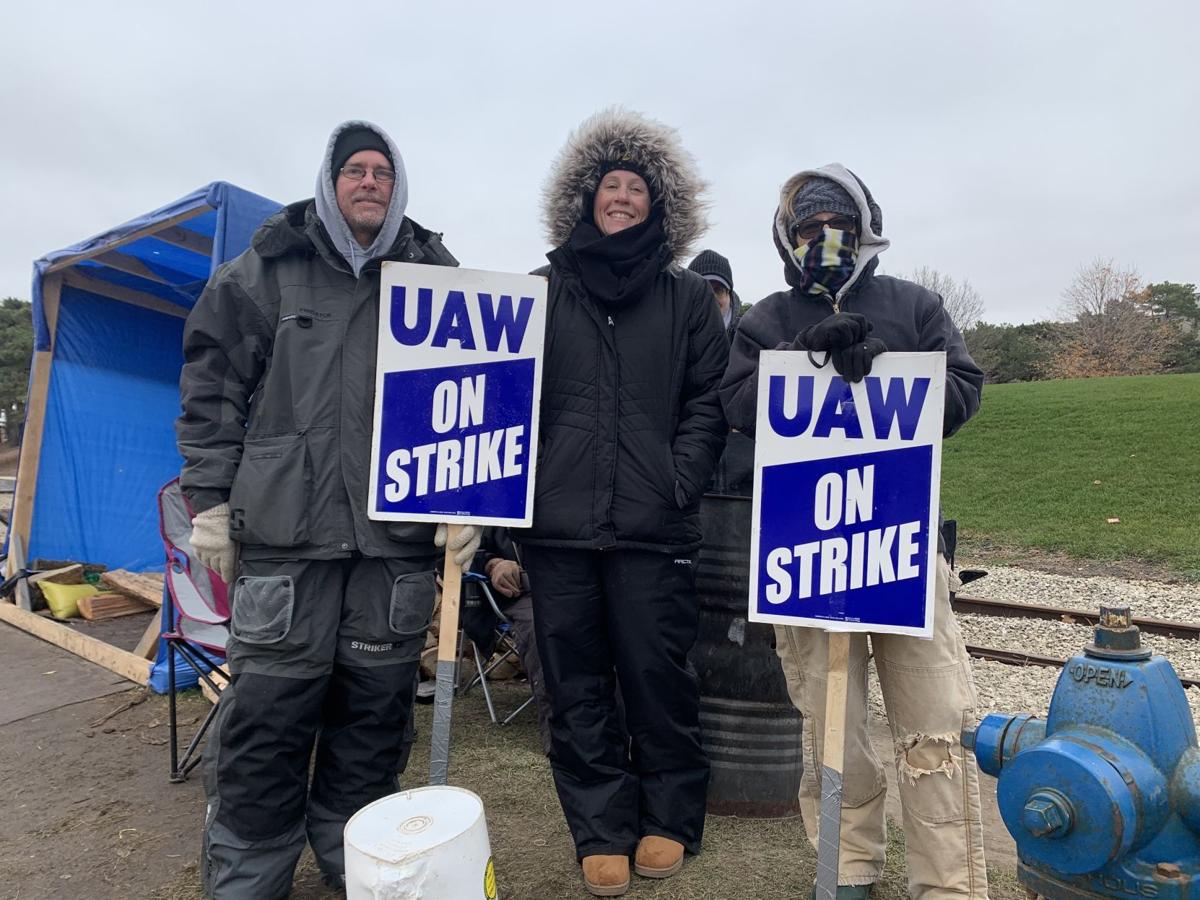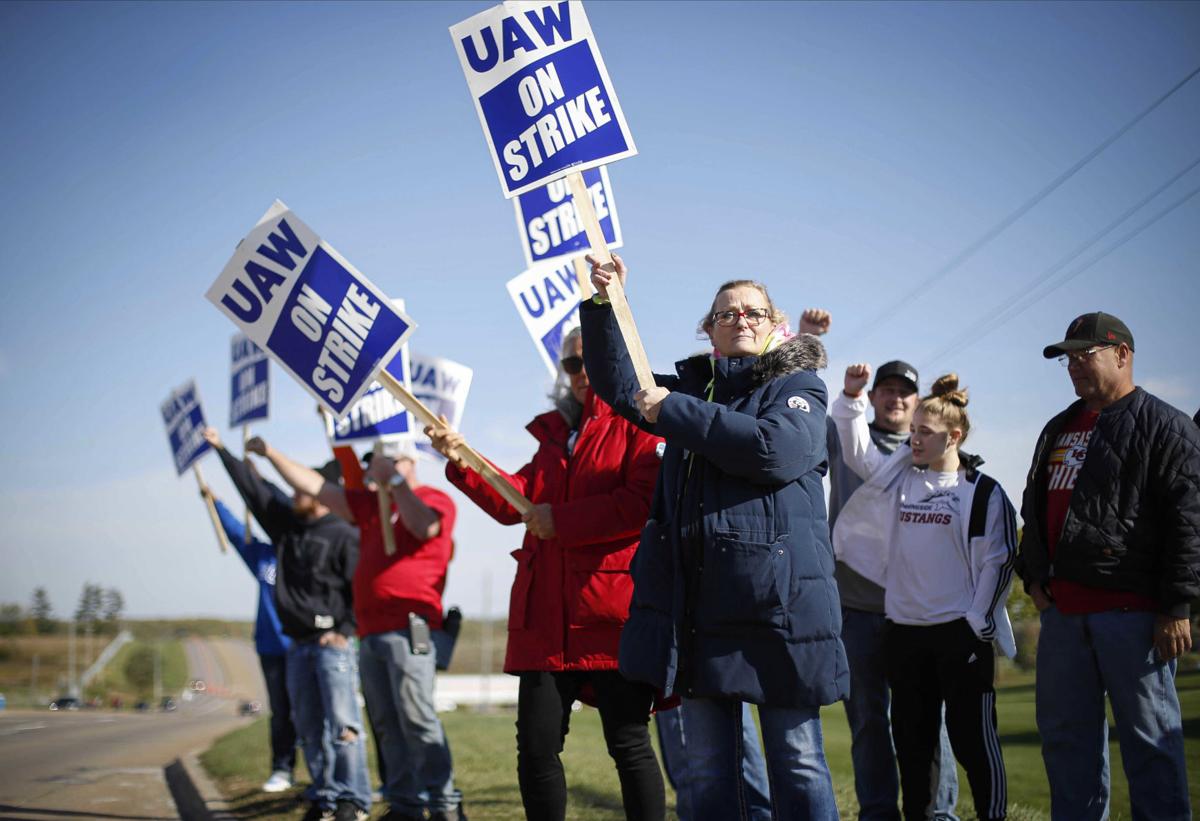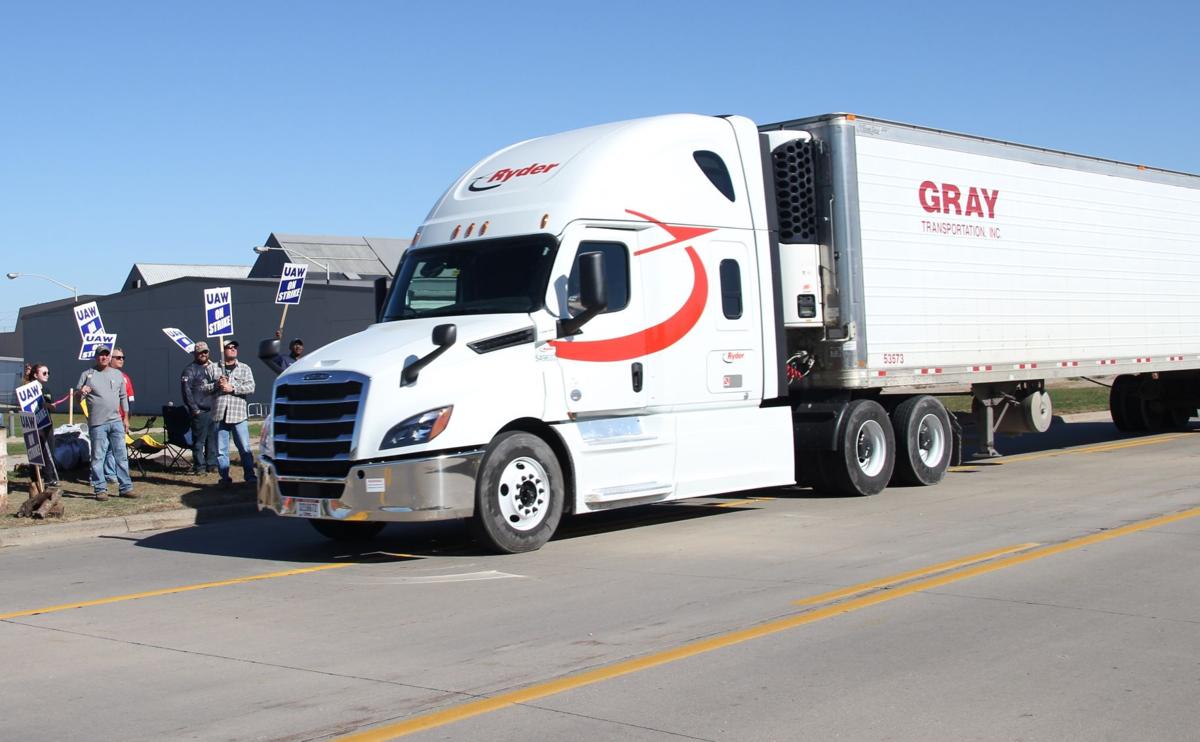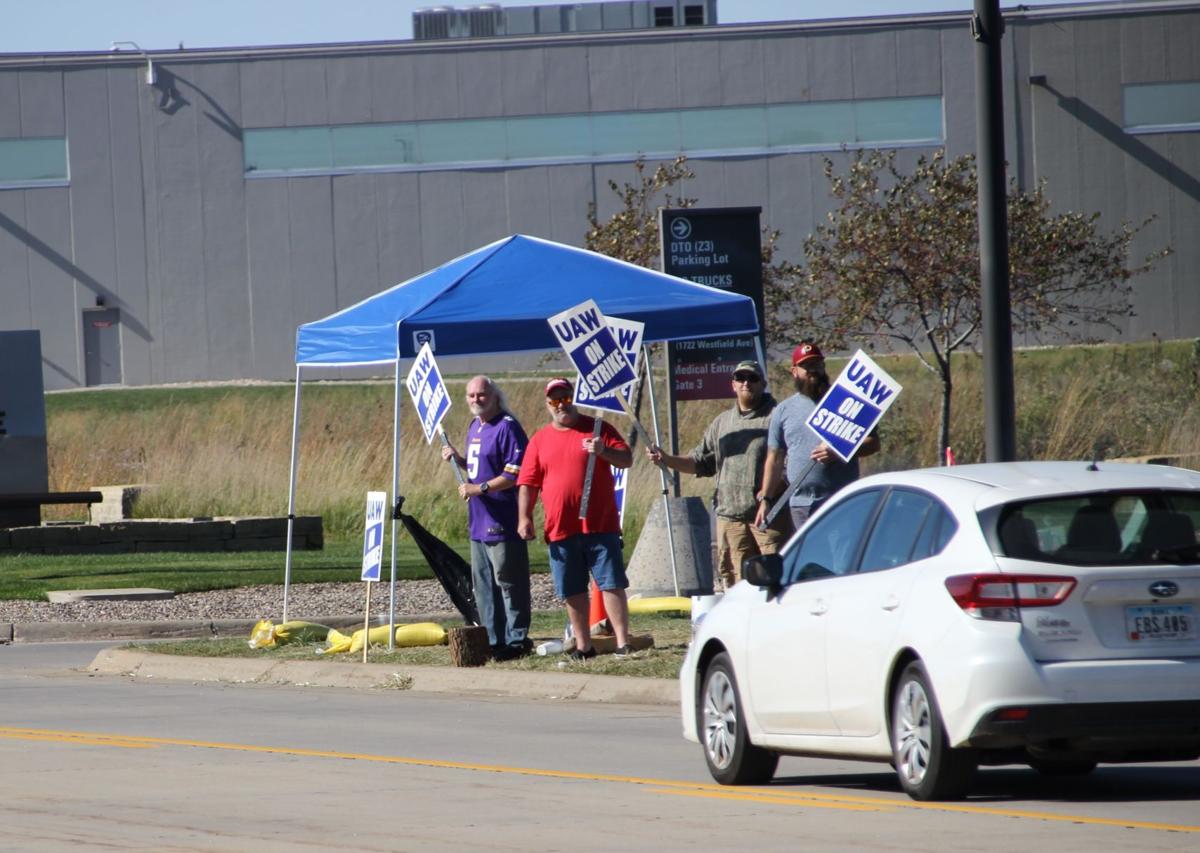AMIE RIVERS CARA SMITH
Nov 13, 2021

UAW Local 838 workers stand on the picket lines outside of the John Deere Foundry in Waterloo on Saturday.

Members of the United Auto Workers strike outside of the John Deere Engine Works plant on Ridgeway Avenue in Waterloo on Oct. 15.
Bryon Houlgrave, The Des Moines Register via AP
AMIE RIVERS CARA SMITH
DES MOINES REGISTER, IOWA
Temperatures didn't get above 40 degrees in Waterloo on Saturday. But it was the frosty reception from Deere and UAW leadership that chilled striking Local 838 workers to the bone.
Deere & Co. and union officials reached a third preliminary contract agreement, it was announced Friday night, and workers who began striking four weeks ago will vote on it soon.
But while striking workers hadn't yet seen the latest offer or gotten a "highlighter" sheet from UAW leadership, picketers said they heard it wasn't much more than the company's second offer. That was rejected by a wide margin in Waterloo -- home to 3,100 of the 10,100 total striking workers.
"We just want higher wages," said one picketer. "They can get rid of that ratification bonus."
The United Auto Workers said in a statement Friday night that the proposed contract with the agricultural machinery giant “includes modest modifications" to the latest rejected proposal, which included immediate 10% raises. The union described the new proposal as the company’s “last, best and final offer” in its statement.
But those on the picket lines in Waterloo on Saturday said they thought the company was not "bargaining in good faith," pointing to a recent letter sent to dozens of Waterloo-area business and community leaders (https://wcfcourier.com/news/local/john-deere-manager-lays-out-latest-offer-to-uaw-in-email-to-local-leaders/article_9319b766-0300-51bc-b747-9199144d87a9.html) from the John Deere Waterloo Works factory manager touting Deere's latest offer.
People are also reading…
Waterloo brothers organize informational picket outside Deere headquarters
UAW members said Deere was misrepresenting how much workers were paid, including CIP pay, or pay for meeting quotas that they say Waterloo workers don't routinely get because of shortages. If the latest offer didn't address that, picketers said, the local will vote it down again, undeterred even as winter creeps in.
"Even with the gains that we made (in the most recent offer), it doesn’t really make up for what we've lost the last 24 years," said another worker, saying they thought Target Distribution workers make more up front. "I think (Deere is) interested in making that known that they've offered quite a bit, but I guess we don't feel like that."
The contract, which union members will vote on Wednesday, would cover more than 10,000 Deere workers at 12 facilities in Iowa, Illinois and Kansas, who make the company’s iconic John Deere green tractors and other equipment.
Deere officials had no comment.
The modified agreement isn’t just a tentative agreement, according to a release from Brian Rothenberg, spokesperson for the UAW. With the second tentative agreement, Deere announced it was their “last, best, and final offer” after the vote. This time, Deere officially declared this the last, best and final offer at the negotiating table, which could potentially trigger legal action, Rothenberg said.
“I know it's caused a lot of confusion,” Rothenberg said. “I've had people say, ‘Well, you know, is it a tentative agreement?’ Well, yes, it is. But it just has a different connotation to it if it goes down.”
James Cooney, employment law expert at Rutgers University, said although declaring best and final offers isn’t unheard of, it doesn’t take place in every labor negotiation.
“Employers often claim to be making a last, best, final offer as leverage in bargaining to try to intimidate the union,” Cooney said.
Temperatures didn't get above 40 degrees in Waterloo on Saturday. But it was the frosty reception from Deere and UAW leadership that chilled striking Local 838 workers to the bone.
Deere & Co. and union officials reached a third preliminary contract agreement, it was announced Friday night, and workers who began striking four weeks ago will vote on it soon.
But while striking workers hadn't yet seen the latest offer or gotten a "highlighter" sheet from UAW leadership, picketers said they heard it wasn't much more than the company's second offer. That was rejected by a wide margin in Waterloo -- home to 3,100 of the 10,100 total striking workers.
"We just want higher wages," said one picketer. "They can get rid of that ratification bonus."
The United Auto Workers said in a statement Friday night that the proposed contract with the agricultural machinery giant “includes modest modifications" to the latest rejected proposal, which included immediate 10% raises. The union described the new proposal as the company’s “last, best and final offer” in its statement.
But those on the picket lines in Waterloo on Saturday said they thought the company was not "bargaining in good faith," pointing to a recent letter sent to dozens of Waterloo-area business and community leaders (https://wcfcourier.com/news/local/john-deere-manager-lays-out-latest-offer-to-uaw-in-email-to-local-leaders/article_9319b766-0300-51bc-b747-9199144d87a9.html) from the John Deere Waterloo Works factory manager touting Deere's latest offer.
People are also reading…
Waterloo brothers organize informational picket outside Deere headquarters
UAW members said Deere was misrepresenting how much workers were paid, including CIP pay, or pay for meeting quotas that they say Waterloo workers don't routinely get because of shortages. If the latest offer didn't address that, picketers said, the local will vote it down again, undeterred even as winter creeps in.
"Even with the gains that we made (in the most recent offer), it doesn’t really make up for what we've lost the last 24 years," said another worker, saying they thought Target Distribution workers make more up front. "I think (Deere is) interested in making that known that they've offered quite a bit, but I guess we don't feel like that."
The contract, which union members will vote on Wednesday, would cover more than 10,000 Deere workers at 12 facilities in Iowa, Illinois and Kansas, who make the company’s iconic John Deere green tractors and other equipment.
Deere officials had no comment.
The modified agreement isn’t just a tentative agreement, according to a release from Brian Rothenberg, spokesperson for the UAW. With the second tentative agreement, Deere announced it was their “last, best, and final offer” after the vote. This time, Deere officially declared this the last, best and final offer at the negotiating table, which could potentially trigger legal action, Rothenberg said.
“I know it's caused a lot of confusion,” Rothenberg said. “I've had people say, ‘Well, you know, is it a tentative agreement?’ Well, yes, it is. But it just has a different connotation to it if it goes down.”
James Cooney, employment law expert at Rutgers University, said although declaring best and final offers isn’t unheard of, it doesn’t take place in every labor negotiation.
“Employers often claim to be making a last, best, final offer as leverage in bargaining to try to intimidate the union,” Cooney said.
Cooney said an official best and last offer could signify Deere is at an impasse in negotiations. The National Labor Relations Board requires an employer and unions to actively negotiate on employment terms “until they agree on a labor contract or reach a stand-off or 'impasse.'” An impasse is a total breakdown of the bargaining process that occurs after good-faith negotiations have been exhausted, according to the NLRB.
“That's not an agreement with the company when saying ‘Hey, this is our last, best, final offer,’” Cooney said. “A union may take that back to the membership but, on the other hand, may choose not to, especially if it's perceived as more of a threat. And that's why there's probably more going on behind the scenes than certainly I'm aware of, on both sides.”
If they are truly at an impasse and the union votes this offer down, Deere has the ability to implement the terms of it with employees working during the strike, Cooney said. Workers would be expected to continue their strike even if the agreement is implemented for remaining employees.
“If there is a true impasse, the law does allow an employer to unilaterally impose the conditions, but very often, there's not a true impasse and a third party such as the National Labor Relations Board might disagree that there was no further room for bargaining,” Cooney said.
The UAW could file an unfair labor practice charge with the NLRB if the new agreement is implemented, he said.
In such cases, NLRB investigates, and if a company is found guilty of refusal to bargain, the NLRB can restore the old agreement and force the parties back to the negotiating table.
But if the NLRB decides the parties are at a true impasse, the company is legally allowed to implement the new agreement and hire replacement workers.
“It depends on so many moving parts,” Cooney said.
To keep negotiations open, Deere and the UAW could bring in a third-party mediator, like someone from the Federal Mediation and Conciliation Service, if they haven’t already.
“I hope the parties would be open to a mediator getting involved,” Cooney said. “But that's really up to them.”
Photos: UAW Local 838 members strike Monday outside Waterloo John Deere facility

Members of the United Auto Workers strike outside of the John Deere facility Monday on West Commercial Street in Waterloo, Iowa.

“That's not an agreement with the company when saying ‘Hey, this is our last, best, final offer,’” Cooney said. “A union may take that back to the membership but, on the other hand, may choose not to, especially if it's perceived as more of a threat. And that's why there's probably more going on behind the scenes than certainly I'm aware of, on both sides.”
If they are truly at an impasse and the union votes this offer down, Deere has the ability to implement the terms of it with employees working during the strike, Cooney said. Workers would be expected to continue their strike even if the agreement is implemented for remaining employees.
“If there is a true impasse, the law does allow an employer to unilaterally impose the conditions, but very often, there's not a true impasse and a third party such as the National Labor Relations Board might disagree that there was no further room for bargaining,” Cooney said.
The UAW could file an unfair labor practice charge with the NLRB if the new agreement is implemented, he said.
In such cases, NLRB investigates, and if a company is found guilty of refusal to bargain, the NLRB can restore the old agreement and force the parties back to the negotiating table.
But if the NLRB decides the parties are at a true impasse, the company is legally allowed to implement the new agreement and hire replacement workers.
“It depends on so many moving parts,” Cooney said.
To keep negotiations open, Deere and the UAW could bring in a third-party mediator, like someone from the Federal Mediation and Conciliation Service, if they haven’t already.
“I hope the parties would be open to a mediator getting involved,” Cooney said. “But that's really up to them.”
Photos: UAW Local 838 members strike Monday outside Waterloo John Deere facility

Members of the United Auto Workers strike outside of the John Deere facility Monday on West Commercial Street in Waterloo, Iowa.

Thirdly. Trades Unions work well as centers of resistance against the encroachments of capital. They fail partially from an injudicious use of their power. They fail generally from limiting themselves to a guerilla war against the effects of the existing system, instead of simultaneously trying to change it, instead of using their organized forces as a lever for the final emancipation of the working class that is to say the ultimate abolition of the wages system.
No comments:
Post a Comment